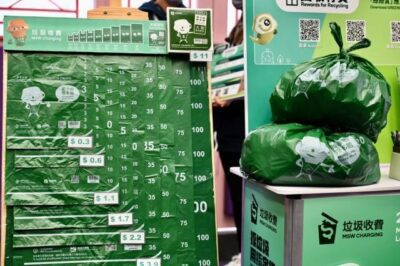Hong Kong, a city known for its high population density and fast-paced lifestyle, faces an increasingly severe waste management problem. In response to this challenge, the Hong Kong government has implemented a waste charging policy in recent years, aimed at reducing waste generation and promoting recycling through economic incentives. This policy has not only changed how residents handle waste but has also encouraged them to reconsider their possessions and management.
Against this backdrop, the concepts of “mini-storage” and “decluttering” have become secret weapons for Hong Kong residents to cope with the new policy. Decluttering, a tidying technique originating from Japan, encourages people to let go of items they no longer need, while mini-storage offers an external space for storing items that are not in use but are hard to part with. The combination of these two not only helps residents effectively manage their home space but also represents a wise choice in maximizing the use of items under the influence of the new waste policy.
Let’s delve into the details of this policy and explore how through decluttering and mini-storage strategies, residents can tackle the challenges brought by this policy. The article will be divided into five sections, as follows:
1. Understanding the Waste Charging Policy
Hong Kong’s waste charging policy is an environmental measure intended to reduce waste generation and encourage waste separation through fiscal means. This policy reflects the “polluter pays” principle, aiming to make citizens and businesses aware of the actual costs of waste disposal, thereby motivating them to reduce waste generation and increase recycling rates.
1.1 Specifics of the Policy
Under this policy, Hong Kong residents must purchase designated garbage bags or pay waste disposal fees for the garbage they generate. The prices of these garbage bags vary according to size, aiming to reflect the cost of waste generation directly in the daily expenses of each household or business. Additionally, the government provides various recycling facilities and services to make it easier for citizens to sort and recycle waste.
1.2 Impact on Daily Life
The implementation of this policy has significantly impacted the daily lives of residents in Hong Kong. Firstly, it has raised awareness about waste generation and classification. Many households have begun to reconsider what they buy and discard, aiming to reduce the waste disposal fees they need to pay. Furthermore, the policy has promoted interest in sustainable living practices, including reducing the use of disposable products and enhancing the reuse and repair of items.
However, the policy also presents challenges, especially for families living in tight housing conditions. In limited spaces, storing infrequently used but cherished items becomes more difficult. This is where mini-storage and decluttering strategies can play a crucial role, helping residents effectively manage their space and belongings while complying with the new waste policy.
With a deeper understanding of the waste charging policy, we can better grasp its specific impact on residents’ lives and find suitable strategies to cope. Next, we will explore the basic concepts of decluttering and how it can help Hong Kong residents lighten their burden under this policy framework.
2.Basic Concepts of Decluttering
Decluttering is a tidying technique that originated in Japan, consisting of three parts: “refuse” (not buying unnecessary items), “rid” (disposing of useless items), and “separate” (detaching from attachment to possessions). This concept is not just about clearing physical space but is a philosophy of life, encouraging people to reevaluate their relationship with possessions and choose what is truly important and meaningful to enrich their lives.
2.1 Application of Decluttering in Life
Decluttering typically starts from a small area, such as a drawer or wardrobe, and gradually expands to the entire living space. When practising decluttering, you need to evaluate each item by asking yourself the following questions: Is this item truly useful to me? Do I love it? How long has it been since I last used it? This process helps people realize what they actually need and what they can let go of.
2.2 Benefits of Decluttering in Reducing Household Waste
Decluttering can significantly reduce the amount of waste a household generates. When people choose not to buy unnecessary items, they naturally produce less packaging waste and expired products. Moreover, by disposing of items no longer in use, households can reduce the need for storage space and avoid future accumulation. Additionally, decluttering encourages people to donate or sell unneeded items, extending their life span and supporting recycling and reuse, thus reducing the need for landfills and incineration.
The practice of decluttering not only helps individuals and families clear physical and mental space but also acts as a counter to consumerism and overconsumption. In a high-pressure environment like Hong Kong, decluttering is particularly important. Next, we will explore the role of mini-storage in the decluttering process and how it helps residents better manage their space.
3. The Role and Benefits of Mini-Storage
In a densely populated city like Hong Kong, where living space is limited, mini-storage offers an effective solution for household storage needs. During the decluttering process, mini-storage plays a crucial role by not only providing a temporary space for items that are seldom used but not ready to be discarded but also offering flexible options for different life stages and needs.
3.1 Benefits of Mini-Storage
i. Expanding Available Space
With limited home space, mini-storage acts as an additional storage area outside the home. This allows residents to free up more living space, enhancing comfort and livability.
ii. Protecting Valuable Items
Some items may be used seasonally (such as ski equipment, holiday decorations, etc.) or have sentimental value and are not frequently used. Mini-storage provides a secure and clean environment, protecting these items from damage or degradation.
iii. Flexible Storage Options
Mini-storages typically offer various sizes of storage units and flexible lease terms. This means residents can choose the most suitable storage solution based on their needs and budget.
iv. Promoting Home Tidiness and Organization
By using mini-storage for seldom-used items, families can more easily maintain tidiness and order at home. This not only improves the quality of living but also reduces the stress of daily cleaning.
3.2 Complementarity of Mini-Storage and Decluttering
Mini-storage and decluttering complement each other in managing household items. Decluttering encourages residents to reduce unnecessary items, while mini-storage provides an appropriate storage place for the items kept. This combined strategy is particularly suitable for those facing space constraints but does not want to completely give up certain items. By using mini-storage in the decluttering process, residents can arrange their items’ storage without compromising home comfort.
In summary, mini-storage provides an effective space management solution in Hong Kong’s high-density living environment. It not only supports residents in maintaining their quality of life while complying with the waste charging policy but also helps them achieve optimal space utilization at home.
4. Combining Decluttering and Mini-Storage to Address Waste Charging
Hong Kong’s implementation of the waste charging policy is designed to encourage citizens to reduce waste generation and promote sustainable living. By integrating the concepts of decluttering and the functionality of mini-storage, residents can more effectively manage household items, reduce unnecessary consumption, and cope with the challenges brought by the new waste policy.
4.1 Synergy between Decluttering and Mini-Storage
i. Item Selection
Decluttering encourages individuals to evaluate the practicality and emotional value of each item, keeping only what is truly necessary or cherished. This process helps reduce the total number of items in the home, lowering the potential for future waste generation.
ii. Temporary Storage Solution
For items that are infrequently used but not ready to be discarded, mini-storage offers an ideal storage solution. This not only clears space in the home but also preserves these items until a decision is made about their necessity.
iii. Reducing Immediate Waste Generation
By storing items in mini-storage, residents can avoid the high costs associated with the immediate disposal of large amounts of items. This also provides more time to consider how to deal with these items, which may include selling, donating, or gradually repurposing.
The strategy of combining decluttering with mini-storage not only helps Hong Kong residents effectively tackle the waste charging policy but also promotes a more environmentally friendly, economical, and organized lifestyle. This approach reduces the immediate disposal of items and increases the overall efficiency in the use and management of possessions, enhancing the quality of urban living.
5. Conclusion
With the implementation of the waste charging policy in Hong Kong, citizens face the dual challenges of managing household waste and maintaining a clean living space. In this context, the combined use of decluttering and mini-storage shows its unique value and effectiveness. Through decluttering, we can not only reduce the accumulation of unnecessary items, thereby directly reducing waste output, but also promote a tidier, more organized living environment. Meanwhile, mini-storage serves as a flexible storage solution for those items that are infrequently used but not yet ready to be discarded, avoiding hasty decisions that lead to overconsumption and providing more time and space to consider the final disposal of items.
Moreover, this combined strategy meets the needs of modern urban living, especially in densely populated and space-constrained urban environments. It not only offers a practical solution to the impending waste charging but also guides citizens towards a more eco-friendly and sustainable lifestyle.
Ultimately, the integration of decluttering with mini-storage is an innovative way to combat the pressures of living space and waste issues. It advocates not just the organization and storage of items but also the optimization of lifestyle, helping us find balance in the fast-paced modern life and achieving harmony between material and spiritual well-being. Hopefully, these strategies will provide help and inspiration to those seeking a better quality of life.
Want to learn more about Hongkong Storage mini storage services or schedule a visit?
Contact us now, and let us help you with your storage needs!
Hongkong Storage Quarry Bay Mini Storage is now offering an extra month free promotion**, welcome to call 3602-7708 for more details.
Schedule a visit now!
Instant WhatsApp inquiry: https://wa.link/lnst17














